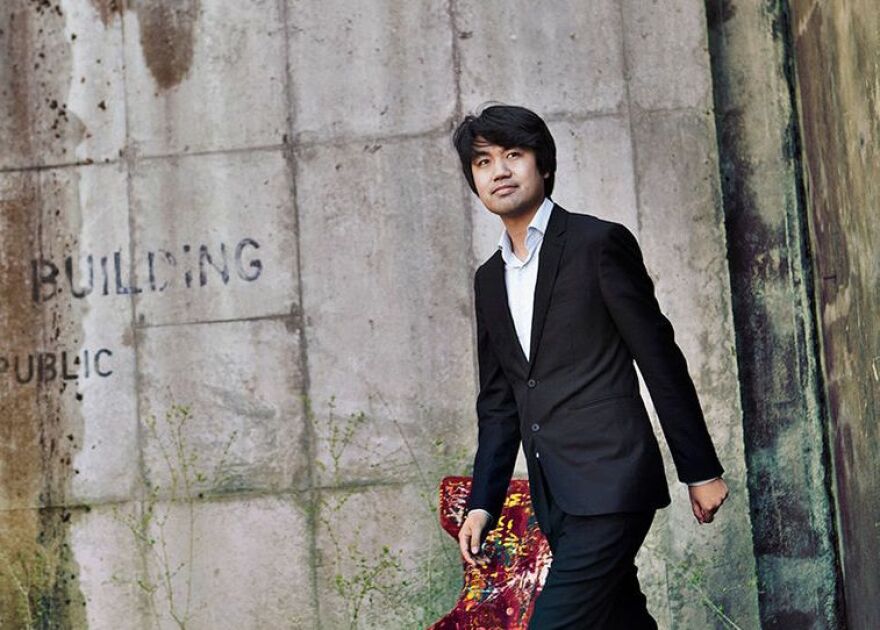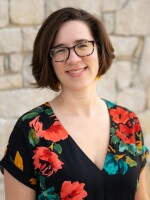Pianist Sean Chen connects his role as performing artist with that of teacher, approaching piano's vast repertoire with humility and fun.
Chen, who is now an artist-in-residence at the University of Missouri-Kansas City Conservatory of Music and Dance, moved to Kansas City from New Haven, Connecticut, two years ago, when his wife Betty, a violinist, joined the Kansas City Symphony. That gave him an instant local connection, and he's collaborated with some Symphony musicians for chamber concerts around town.
"They are happy to have a pianist they can drag around," he jokes.
"It's been a lot of fun," he says, "because I haven't gotten to do a lot of chamber music, traveling around. Usually when people have you, they want you to play solo or concerti."
Chen arrived with accolades: recent tours across the United States and performances in Europe; the 2013 Van Cliburn International Piano Competition Crystal Award (he was the first American to reach the finals since 1997); the American Pianists Association's Christel DeHaan Classical Fellowship in 2013; and an Annenberg Fellowship Award in 2015, along with degrees from the Juilliard School and an artist diploma from Yale University.
On the recommendation of UMKC's Robert Weirich, himself a world-class pianist, Chen became artist-in-residence as the Conservatory's piano department navigated major transitions with impending retirements and shifting roles. (The Conservatory plans to introduce two new world-class pianists to the faculty in the fall of 2018).
Between the faculty and students at UMKC, the University of Kansas and the International Center for Music at Park University, Chen says "there's a hot spot of pianists" in Kansas City.
Amid this atmosphere, he makes his Kansas City solo debut with a recital Sunday in UMKC's White Recital Hall.
The pieces he'll be performing "have a nostalgic quality to them," he says. "All these composers have a sort of backwards looking aesthetic" in structure and harmonies, and are connected by bell-like qualities in the writing.
He notes that Federico Mompou explores "poignant, introspective moments" in "Variations on a Theme of Chopin," while Maurice Ravel's translucent "Miroirs" (written in his younger "Les Apaches" days) has an antique quality, "like looking at the past through these French rose colored glasses." He'll also perform Nikolai Medtner's "Sonata-Ballade, Op. 27" (Medtner was a friend and colleague of Sergei Rachmaninoff), which Chen says is steeped in the forms and harmonies of the Romantic era, as well as a Russian Orthodox influence, culminating with sounds of chant and ringing bells.
The recital also contains one of Chen's own works, a rare event for a concert pianist. Though he hasn't done much composing since 2013, when he started touring, he wrote this one a few years ago at the request of a friend.
"The problem when you are a performing musician is that you play all this great music and, especially if you are writing for the piano, you put something down and think, 'meh.'"
While he doesn't have extensive formal training in composition, Chen likes to expand and challenge himself — while at Juilliard, he took classes at Columbia University in computer graphics, mathematics, and programming — and considers the practice of composition an important creative outlet.
"It connects you with the music more. You can't really say you know how another composer thinks, but once you start writing it gives you a little more insight," he says. "Even if it's not something you do often or well or even seriously, it's a worthwhile exercise."
He started composing as a teenager because he wanted to make his own versions of video game music and he improvises, enjoying on-the-spot spontaneity. When Chen was growing up, he admits, he didn't always feel like practicing.
"But I loved being on the piano, so I ended up figuring out and playing a lot of things by ear and learning how to do that better and better."
He's turned his attention to writing transcriptions, recently featured on The Violin Channel for his transcription of J.S. Bach's Solo Violin Sonata No.3.
"Those are pieces I can play in concert and feel less self-conscious about it because the music is already good. It allows me to study the work while I'm transcribing as well as put on the piano something I really enjoy listening to and am able to perform," he says.
"It's like being a conductor without worrying about being a conductor."
At UMKC, he teaches a handful of students, fitting in teaching responsibilities with his performance schedule, balancing high performance standards with reasonable expectations.
"When you go into something like music you never know if you are going to make it or not — 'make it' as whatever you define it as — but if you want to be a performing musician, there's not a lot of room in the market."
"You don't really decide to be a performing musician until you win something or you get a break — and then you are suddenly touring and playing," Chen says.
But his own experience provides a useful example for students.
"There were multiple times throughout school when I second guessed and thought maybe I should just stop piano and go get a programming degree" — his brothers both work in the tech industry — "and get paid twice as much and I won't be unemployed," he says.
"But all those times when you think you want to stop something comes along and you think 'maybe I'll keep doing it.' And here I am."
University of Missouri-Kansas Conservatory of Music and Dance presents a faculty recital by Sean Chen, 7:30 p.m., Sunday, April 15, at White Recital Hall 4949 Cherry Street, Kansas City, Missouri. The performance is free.
KCUR contributor Libby Hanssen writes the culture blog Proust Eats A Sandwich. Follow her on Twitter, @libbyhanssen.



